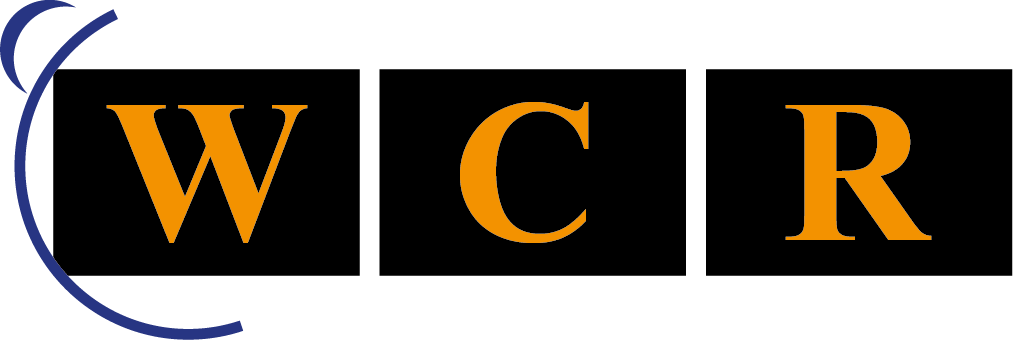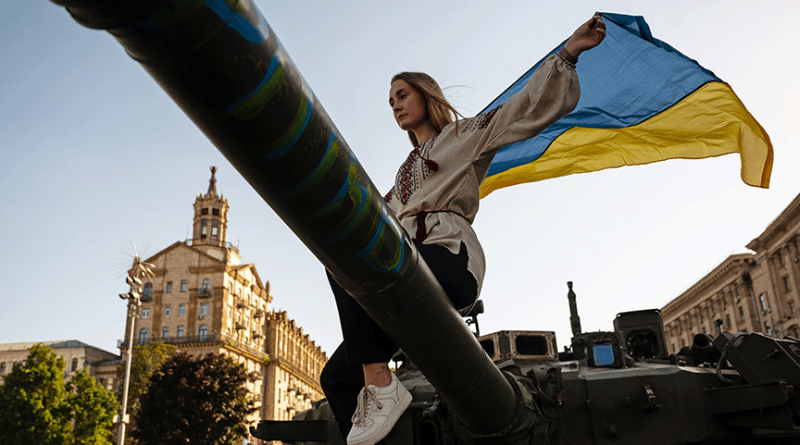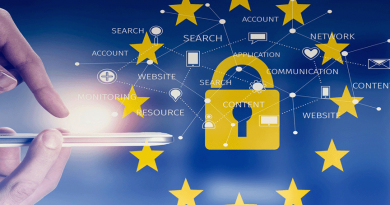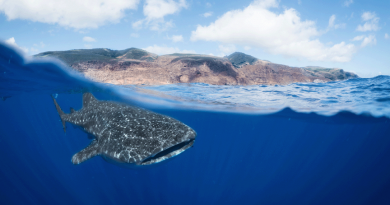Europe and its defence
Patrick van Schie is a historian and Director of the TeldersStichting, the liberal think tank of the Netherlands
On the eve of the meeting between Trump and Putin in Alaska, Russian Foreign Minister Lavrov wore a remarkable T-shirt. His jacket was open just enough to reveal the letters CC, along with part of a letter before as well as after them. The full text undoubtedly read: CCCP, the Russian abbreviation for USSR.
This was not merely a nostalgic message but above all a deliberate threat: the current Russian regime seeks to restore dominion over the former ‘Eastern Bloc’ or, at the very least, over all territories that once belonged to the Soviet Union.
We want to gain control of all of Ukraine, Lavrov thereby (once again) indicated. But regarding Europe as a whole, the message that the Kremlin longs for the old Soviet empire directly affects at least ten current NATO member states: the three Baltic states, six former satellite states in Central and Eastern Europe, and Germany (as it now includes the territory of the former GDR).
Even if the Kremlin’s ambitions were limited to reasserting control over the Soviet Union’s former borders, the message would still be clear: after Ukraine, the Baltic states will be next. Estonia, Latvia, and Lithuania hardly needed reminding that they are on the Kremlin’s ‘menu’. Their centuries-long experience with Russian aggression and the trauma of half a century of communist oppression are deeply etched into their national consciousness. Other NATO members, however, would do well to realize that Putin’s hunger for power extends far beyond the Donbas.
Many NATO states do indeed seem to have been awakened – after years of ignoring Putin’s clear statements and failing to treat the Russian annexation of Crimea and its military meddling in eastern Ukraine as alarm bells. It was only the war that Putin and his allies launched against Ukraine in February 2022 that finally opened many eyes. Yet it remains to be seen whether Western politicians truly wish to recognize that Russia’s expansionist drive reaches far beyond Ukraine.
An alternative lesson from the USSR era
That the Soviet Union was one of the last colonial powers, and that Russia has never accepted the decolonization that began in 1991. is something protesters in free countries, who demonstrate to incur colonial ‘guilt’ and ‘colonial trauma’, systematically ignore.
Russia, for its part, shows no sense of remorse; quite the contrary. But if Lavrov is fond of reminiscing about the ‘good old days’ of the Soviet Union, he might also reflect on other implications from half a century ago.
Back then, the Helsinki Final Act was signed. In it, the free West and the communist ‘Eastern Bloc’ agreed on principles such as freedom of conscience, religion, and the exchange of ideas and press. However, the communist signatories had no intention of honouring these principles. “We are masters in our own house”, Soviet foreign minister Gromyko whispered reassuringly to Soviet leader Brezhnev, meaning: we ourselves will decide whether to observe these human rights.
The reason Soviet leaders accepted these (empty) promises on human rights was that they received something significant in return under what was called the First Basket: recognition of Europe’s post-war borders and the solemn promise that these borders could only be altered peacefully and by mutual consent. This was the grand prize Brezhnev secured in 1975. But it is also an agreement that Putin and Lavrov flagrantly violate to this day.
If Trump truly wants peace, he will at the very least have to commit troops himself. Until he is willing to send American forces to Ukraine, his peace initiative cannot be taken seriously
When the Soviet empire collapsed around 1989-91, most regimes in Central and Eastern Europe underwent change, but borders mostly did not. Czechoslovakia split into two countries, but this was achieved without spilling a drop of blood and with the mutual consent of Czechs and Slovaks. The three Baltic states regained the independence and freedom violated in 1940, but their borders with the Russian rump state remained unchanged. By contrast, Putin’s violent seizure and annexation of Crimea in 2014 was a unilateral act of aggression, constituting a breach of the Helsinki Final Act.
Any potential ‘peace’ between Russia and Ukraine that involved recognition of territories seized by the former from the latter – which, as I write this about a week after the Alaska summit, is still unforeseeable – would ipso facto constitute a violation of the Helsinki Final Act. Because it would be a reward for brute aggression.
And it would send a disastrous signal to other nations: that one can get away with waging war against another country and violently seizing its territory, indeed that one can even profit handsomely from it. Aggression pays, that would be the message. A message that would not be lost on eg. Beijing or Pyongyang.
What kind of peace?
Trump is right that the further loss of life among Ukrainian and Russian soldiers is extraordinarily tragic. An end to the war would, in that sense, be a good thing. Of course, every war eventually comes to an end. But how it ends and under what peace terms makes all the difference.
A peace that amounts to surrender for Ukraine may be more unbearable than continuing the fight. Otherwise, the soldiers already killed or maimed will have been sacrificed in vain. Moreover, an independent existence in freedom is far preferable to a life of oppression and servitude.
The Americans, in 1776 and the years that followed, did not choose to continue living as a British colony, even though the rule of King George III was far milder than the predatory regime of Putin and his associates.
Moreover, it is a mistake to believe that such a peace would satisfy Putin. If the Kremlin is rewarded for committing aggression, it will only whet its appetite for more. The Russians will bide their time until a favourable moment arises to strike again, hoping that the Western world will have grown weary of the conflict and cease its support for Ukraine.
It is therefore understandable that Ukraine seeks security guarantees and is not content with mere promises. Promises from the Kremlin are worthless, but paper promises from Western countries are hardly better. The only pledge that carries real weight for Ukraine is boots on the ground. They must come from nations capable of exerting substantial military force.
Several European countries currently seem willing to provide this. Yet it would be unwise if the military force guaranteeing Ukraine’s security consisted solely of Europeans. Would this really deter the Kremlin?
Ultimately, only the fear of nuclear retaliation or of conventional superiority will prevent Putin and his circle from launching another attack. Only an American military presence in Ukraine constitutes credible deterrence for the Kremlin.
Without American forces, Europeans would face a grim choice in the event of renewed Russian aggression: stand by passively while Ukraine is attacked and pushed back again, or go to war with Russia themselves. Europe would then be thrust into a situation that has been carefully avoided since February 2022.
If Trump truly wants peace, he will at the very least have to commit troops himself. Until he is willing to send American forces to Ukraine, his peace initiative cannot be taken seriously.
EU ≠ Europe
Trump is also correct that many European countries have shamefully neglected their defence for years. But he is certainly not the first American president to raise this issue; the question of fair ‘burden sharing’ was already contentious during the Cold War. At its end, many European nations irresponsibly slashed their defence budgets under the naïve assumption that war on the European continent had become unthinkable. What was dismantled then must now be rebuilt, at far greater effort and expense than if proper defence capacities had been maintained.
At the NATO summit this June, member states committed to spending at least 5% of their GDP on defence in the future, of which 3.5% for the armed forces themselves and 1.5% for related matters such as infrastructure and digital security. Whether all members will honour this commitment remains to be seen.
In the 1970s and 1980s, several members paid scant regard to the obligation to allocate at least 3% of GDP to defence. Even the 2014 Cardiff pledge to spend a minimum of 2% was until recently flouted by a large majority of member states. The fact that notorious free riders such as Spain and Belgium opposed the new requirement right up to the NATO summit in The Hague is also telling.
Although additional defence spending currently enjoys relatively broad voter support, it takes courage for politicians to sustain this in the long term. The commitment made in The Hague will cost most member states tens of billions annually, to be raised either through (even) higher taxes or by cutting social spending or healthcare, as these are typically the largest budget items in most Western countries. How much support for additional defence spending will remain once the threat from Russia or other hostile states appears somewhat less urgent?
The European Commission in Brussels now seeks to position itself as the willing executor of this new defence agenda. It wants to give the European Union (EU) a strong defence arm. It would be unwise to allow this. There already exists a streamlined organization responsible for Europe’s military defence: NATO. There is no need for duplication.
Moreover, European nations must do everything possible to keep the United States engaged in their security. And some defence tasks cannot be assumed by Europeans – or only after a very long time.
It is also inconceivable that Europe would build a nuclear deterrent comparable to that of the US, regardless of whether such an endeavour would even be desirable. Even if, in the long run, the United States were (unfortunately) to loosen its ties with Europe, it remains of utmost importance that non-EU members such as Canada, Norway, and the United Kingdom – which has Europe’s most capable and experienced armed forces – continue to stand militarily and politically shoulder to shoulder with the EU member states.
Europe is much more than the European Union. The EU would do better to focus on core tasks on which it is underperforming: completing the internal market, restoring the health of the eurozone, keeping budget offenders (such as France and Italy) in check, securing external borders against the influx of illegal migrants, and so forth. European countries must urgently grow up militarily. They should do so within an organization that, over its 75-year existence, has proven not only to be mature but also to operate with unmatched success at deterring the enemies of the free world. This organization is NATO.




